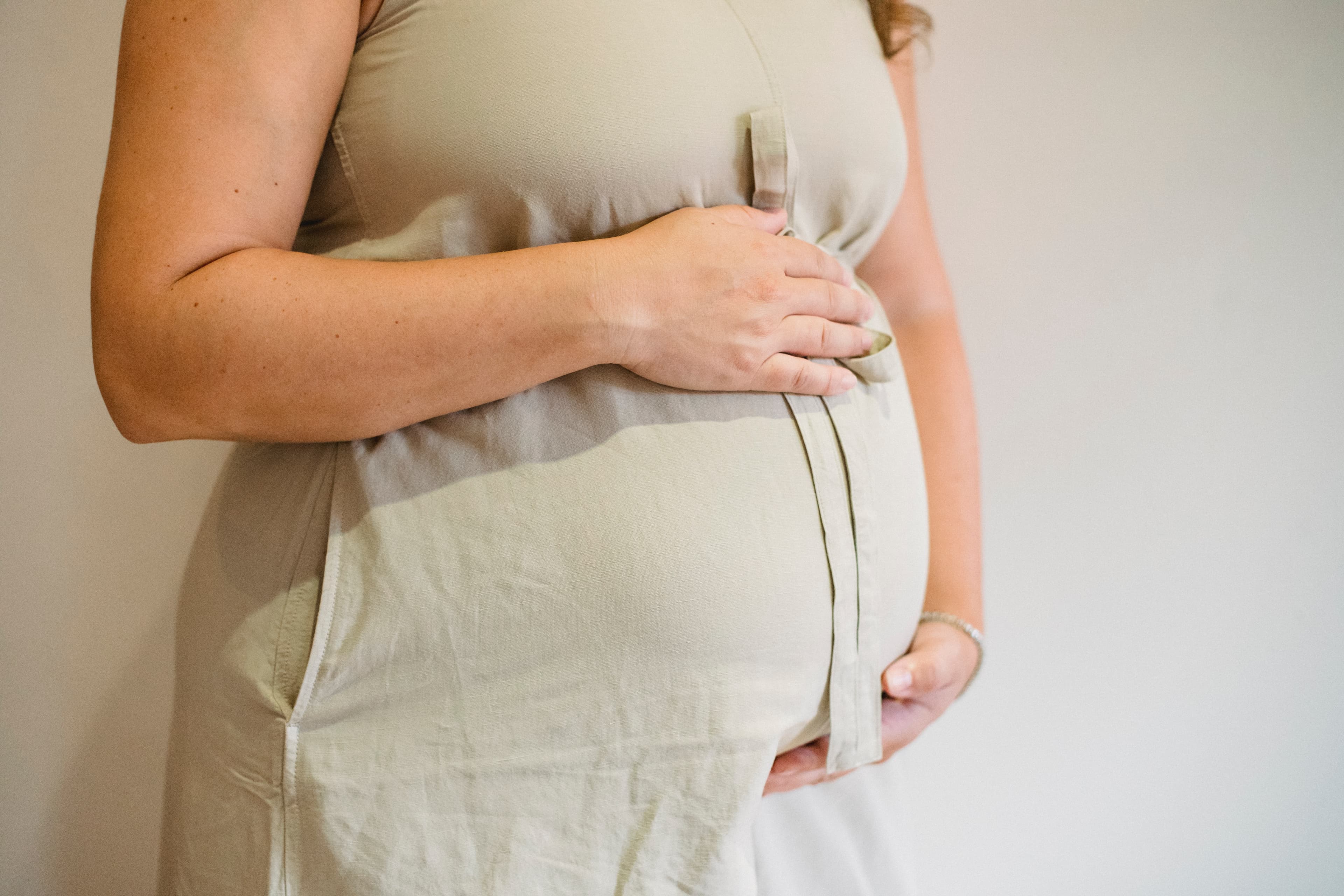Incontinence During Pregnancy: Why it Happens and What To Do About It

Written by Chad Birt on Mon Mar 20 2023.

Learning you’re pregnant is incredibly exciting, but carrying a baby is hard work.
Many expecting mothers experience nausea, muscle pain, and food aversions. Another common but less talked about symptom is urinary incontinence. Research suggests that 30-50% of pregnant women experience some degree of urinary incontinence, mainly during the second and third trimesters.
Pregnancy-related incontinence can be embarrassing to talk about, but it’s nothing to be ashamed of. By the time you finish reading this article, you’ll know why pregnancy-related incontinence occurs and how to prevent it from affecting your quality of life.
What Causes Urinary Incontinence During Pregnancy?
Pregnancy-related urinary incontinence can occur for several reasons, including:
Excess pressure on the bladder
During the third trimester of pregnancy, the uterus grows, causing the baby to drop down into the pelvis, pressing against the bladder.
Hormonal changes
Hormone levels fluctuate throughout pregnancy. As delivery gets closer, the body releases a flood of hormones, including progestin and relaxin. These chemical messengers loosen the cervix and the ligaments in your pelvis, making it easier to give birth. The loosening process may also increase your risk of leaks or accidents.
Gestational diabetes
Gestational diabetes may occur in some women during pregnancy. Without intervention and treatment, high blood sugar can cause permanent damage to the nerves in the bladder. If these nerves don’t function properly, accidents are more likely.
Urinary tract infection (UTI)
UTIs occur when bacteria enter the urethra, causing an infection in any part of the urinary system.
Though anyone can experience a UTI, pregnancy significantly increases the risk. That’s because hormonal changes can trigger vesicoureteral reflux, which causes urine to flow backward into the kidneys.
What Can Expecting Mothers do to Prevent Urinary Incontinence During Pregnancy?
There are several things expecting mothers can do to prevent urinary incontinence during pregnancy.
To gather some professional insights, we reached out to Lisa Lawless, Ph.D., a clinical psychotherapist with over 20 years of experience working with women dealing with urinary incontinence, and Parmeet Kauer, a pelvic floor therapist at Brentwood Physiotherapy in Calgary, Ontario, Canada.
Lawless and Kauer recommend:
1) Strengthen your pelvic floor.
“The most crucial step to preventing urinary incontinence is strengthening your pelvic floor muscles through Kegel exercises,” Lawless said.
Kauer agrees, “strengthening your pelvic floor muscles through exercises like Kegels can help support your bladder and improve urinary control.”
Recommended Reading: Combating Incontinence with Kegels
2) Maintain a healthy weight.
Excess belly fat puts additional stress on your bladder and the muscles in your pelvic floor. You’re bound to gain some weight during pregnancy, but it’s important not to overdo it. Your OB/GYN can make nutrition and exercise recommendations to help you stay on track.
3) Avoid drinks that irritate the bladder
Certain beverages, like coffee, tea, or carbonated soda, can irritate your bladder and cause the urge to urinate. If possible, avoid caffeine during your pregnancy and drink lots of water.
Pro tip: Infuse your water with fresh fruits, like lemon slices or berries, to make it more flavorful and appealing.
4) Eat fiber to stay ‘regular’
It’s crucial your diet contains plenty of fiber from sources like fruits and vegetables. If you don’t have regular bowel movements, stool can build up and put added pressure on your pelvic floor.
5) Practice good hand and toilet hygiene
After urinating, wipe from front to back and always wash your hands. Good toilet and hand hygiene can keep harmful bacteria out of your urinary tract and reduce the risk of infection or irritation.
6) Stock up on incontinence products
Planning and preparation won’t necessarily prevent pregnancy-related incontinence, but they can protect your clothing and furniture and keep your skin healthy.
“Pads or period underwear can help manage small leaks and prevent skin irritation during pregnancy,” Lawless said. “Try to use pads or period underwear that is eco-friendly, as some contain harmful chemicals.”
Kauer agrees, noting that “booster pads and other incontinence products can be helpful at preventing accidents and relieving skin irritation.”
Still, he emphasizes that “the only way to improve urinary control in the long term is by addressing the underlying issue –– for example, weak pelvic floor muscles.”
Recommended Incontinence Products
Here at Carewell, we have tons of incontinence products for expecting mothers.
Commonly Asked Questions
Now that you know what causes pregnancy-related incontinence (and what to do about it), let’s look at some of the most common questions our Caregiving Specialists receive:
1) Does incontinence go away after the baby is born?
It depends. Mild and moderate urinary incontinence typically resolves within a few weeks or months after giving birth. However, for some women, incontinence may last longer. That’s particularly true if you have a weak pelvic floor or your pelvic floor muscles were damaged during labor and delivery.
2) Should I talk to my OB/GYN about urinary incontinence?
Yes, absolutely! Urinary incontinence is a common and very treatable problem. The sooner you speak with your gynecologist about your symptoms, the sooner you can take steps to prevent them.
3) During what stage of pregnancy is urinary incontinence most common?
Urinary incontinence can occur at any time during your pregnancy, but it’s most common during the third trimester when the body releases hormones like progestin and relaxin in anticipation of delivery.
Takeaways
Urinary incontinence is one of the most common side effects of pregnancy, but it’s very treatable.
“Seeking support from a healthcare provider, pelvic floor physical therapist, or sexual health professional can help manage symptoms and improve one’s quality of life,” Lawless said.
Kauer agrees, once again emphasizing there’s nothing to be ashamed of.
“A physical therapist or pelvic floor specialist can provide guidance on exercises to strengthen your pelvic floor muscles and other strategies to improve urinary control.”
Other Articles You May Like

Combating Incontinence with Kegels
Urinary and bowel incontinence can strike at any time, even if you’re in relatively good health. Fortunately, combating incontinence with Kegels is possible.
Medically Reviewed by Kiera Powell, R.N.

Expert Tips on Managing Urinary Incontinence in Public
Since our Caregiving Specialists regularly receive calls about urinary incontinence, incontinence management, and incontinence products, we wanted to provide some pro tips for managing urinary incontinence in public.
Read More >
Chad Birt is a freelance medical writer who resides in Astoria, Oregon. When he isn't behind a keyboard, you can find him hiking, camping, or birdwatching with his wife Ella and their two dogs, Diane and Thoreau.